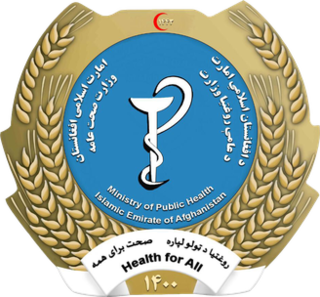
Panjshir is one of the thirty-four provinces of Afghanistan, located in the northeastern part of the country containing the Panjshir Valley. The province is divided into seven districts and contains 512 villages. As of 2021, the population of Panjshir province was about 173,000.

Ministry of Public Health of Afghanistan is the ministry of the government of Afghanistan which deals with matters concerning the health of Afghanistan's population. As of 2021 the acting minister of Health was Dr. Wahid Majrooh until Taliban Takeover of Kabul. The Ministry of Public Health provides an annual report to inform the public of advancements in Afghanistan's health sector.

The Afghan Ministry of Energy and Water is a ministry of the government of Afghanistan. Following the U.S. invasion of Afghanistan the ministry had the task of co-ordinating an effort to reintroduce power to areas of Afghanistan that had been cut off. Areas particularly badly affected were southern regions. Pakistan, Iran, and India all agreed to supply power. On 17 June 2003 the Asian Development Bank agreed to give a loan of $50 million (USD) to the Afghan Ministry of Energy and Water. The loan would be spent over the next three years on projects for the production, distribution and transmission of electricity in Afghanistan.

The Council of Ministers of the Islamic Emirate of Afghanistan is the executive body of the government of Afghanistan, responsible for day-to-day governance and the implementation of policy set by the Leadership. It is headed by the prime minister—who serves as the nation's head of government—and his deputies, and consists of the heads and deputy heads of the government ministries.
Guzargahi Nur or Gozargah-e-Noor is a district in Baghlan province, Afghanistan. It was created in 2005 from part of Khost wa Firing District.

The Ministry of Communications and Information Technology (MCIT) is an organ of the government of Afghanistan. Current communications minister is Najibullah Haqqani. The Ministry was subjected to a suicide attack in 2019.

The Ministry of Borders and Tribal Affairs, is an organ of the Central Government of Afghanistan.

The Afghan Ministry of Education is responsible for policy formulation, the organization, and supervision of education in Afghanistan. Its headquarters is located in Kabul. The current Education Minister is Rangina Hamidi. The Ministry of Education provides a semi-annual report to inform the public of advancements in Afghanistan's education sector.
There are 26 government ministries in Afghanistan.

The Afghan Ministry of Information and Culture is the Afghan Government Ministry in charge of Culture, Tourism, Publishing Affairs and Youth Affairs. The ministry is currently led by Khairullah Khairkhwa.

The Afghan Ministry of Transport and Civil Aviation is the Afghan Government Ministry in charge of the management of air and ground transportation, operation of airports and the national airline, as well as numerous other state-owned enterprises engaged in the transport business. As of 2021 the minister is Hamidullah Akhundzada.
The Disaster Management Act, 2005, No. 53 of 2005, was passed by the Rajya Sabha, the upper house of the Parliament of India on 28 November, and the Lok Sabha, the lower house of the Parliament, on 12 December 2005. It received the assent of The President of India on 23 December 2005. The Disaster Management Act, 2005 has 11 chapters and 79 sections. The Act extends to the whole of India.
Wais Ahmad Barmak is an Afghan politician who served as the Minister of Interior. Prior to that, he served as Minister for Disaster Management and Humanitarian Affairs of Afghanistan and as Minister of Rural Rehabilitation and Development.

The Afghan Armed Forces, officially the Armed Forces of the Islamic Emirate of Afghanistan and also referred to as the Islamic Emirate Armed Forces, is the military of Afghanistan, commanded by the Taliban government from 1997 to 2001 and since August 2021. According to Afghanistan's Ministry of Defense, its total manpower is 170,000.
The Chief of Staff of the Armed Forces is the highest-ranking military officer in the military of Afghanistan, who is responsible for maintaining the operational command of the military.
A series of flash floods occurred in Afghanistan beginning in June 2020, with the largest and most impactful flood occurring on 26 August 2020. They were caused by torrential rain in Charikar, Parwan Province. The August floods killed at least 179 people and injured 212 others, and destroyed hundreds of houses. The Ministry of Disaster Management has also reported some casualties and destruction of infrastructure in the provinces of Kapisa, Maidan Wardak, Nangarhar, Panjshir, and Paktia.
The government of Afghanistan, officially called the Islamic Emirate of Afghanistan and informally known as the Taliban government, is the central government of Afghanistan, a unitary state. Under the leadership of the Taliban, the government is a theocracy and an emirate with political power concentrated in the hands of a supreme leader and his clerical advisors, collectively referred to as the Leadership. The Leadership makes all major policy decisions behind closed doors, which are then implemented by the country's civil service and judiciary. As Afghanistan is an Islamic state, governance is based on Sharia law and Pashtunwali, which the Taliban enforces strictly through extensive social and cultural policies.
Mullah Mohammad Abbas Akhund is an Afghan Taliban politician who is serving as Acting Minister of Disaster Management of the Islamic Emirate of Afghanistan since 23 November 2021. Abbas has also served as Minister of Public Health in the Taliban's previous regime (1996–2001). He is an ethnic Pashtun and belongs to the Achakzai tribe from Spin Boldak district, Kandahar province. He was born in Khas Uruzgan District, Uruzgan Province.
Mullah Faizullah Akhund is an Afghan Taliban politician who is serving as acting head of the Afghanistan National Standards Authority since 14 March 2022. Akhund has also served as Deputy Minister of youth affairs at Information and Culture Ministry from 23 November 2021 to 14 March 2022.










